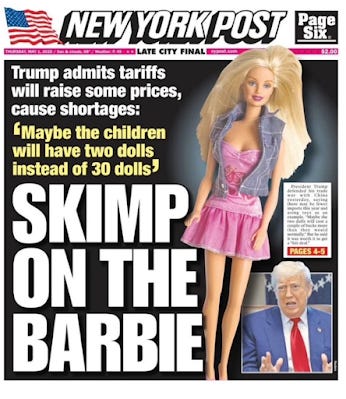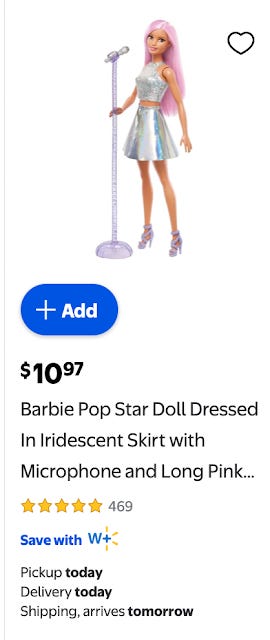"Call me irresponsible
Call me unreliable
Throw in undependable too."
Bobby Darin, "Call Me Irresponsible," 1964
Trump: "Well, maybe the children will have two dolls instead of 30 dolls, you know? And maybe the two dolls will cost a couple of bucks more than they would normally."
Barbie dolls sell for about $10 retail in the U.S.
The labor component for the Chinese workers to assemble the doll is about 35 cents. This raises the question of what Americans are complaining about? If that is too much, would Americans complain if they were totally free, like manna from heaven? The margin on a Barbie doll, in excess of its labor costs to manufacture is some $9.65 out of $10.00. Isn't that enough for the American share? Does anyone think that squeezing new margin out of that 35 cents is the place to find the big bucks?
Chinese labor is only part of the cost of making a Barbie Doll. China Daily, an English language outlet for the Chinese government, claimed that the total cost to Mattel for creating Barbie dolls, packaged in ready-to-sell cardboard and cellophane boxes, was 50 cents. It is probably more than that. Other sources say that the total cost of the ready-for-sale Chinese products, with profit for the manufacturers at each step, delivered to the port of Long Beach, California, is closer to 20 percent of their final retail prices: $2. Electric toothbrushes that sell for $10 to $15 have an all-in manufacturing cost, including procuring components, of about a dollar, and cost $2 wholesale, delivered to Long Beach. Electric hair dryers that retail for $30 cost about $2.50 to manufacture and wholesale for $4.
Even a full 140 percent tariff on Barbie dolls would not mean a doll need rise in price from $10 to $25 dollars. There would be gamesmanship in a Barbie doll's value at the point of entry -- a chronic and inevitable problem with customs duties -- but the value of a box containing a Barbie doll would be declared to be valued at something well under $2. That would mean a net price, with full 145 percent tariff paid, of perhaps $4. If Mattel, and then Walmart, kept the existing retail margins over wholesale, the price of a Barbie doll would rise from $10 to $12, not $25.
However a tariff on Barbie dolls could be the excuse for a price increase. Consumers might expect the dolls to double in price, so a rise from $10 to "only" $15 might look like sacrificial pricing by Mattel and the retailer, when in fact their margins, calculated in dollars, not percentage of wholesale, would have risen.
One way to react to the cost of manufacturing simple goods from China is to despair. How can Americans possibly manufacture a Barbie doll cheaper than can the Chinese? The other way to look at it is: "Why bother." Why fight to get inside the 35 cents? The real margin and value is in the branding and intellectual property owned by Americans.
There are good reasons for Americans to keep on-shore manufacture of items critical to our national security. Steel. Aluminum. Weapons. Computers and computer parts. Aerospace technology. Energy. Food. The U.S. is fortunate. We can manage this without tariffs.
In the past two weeks the stock market has rebounded. It reflects investors' expectation that Trump is bluffing, or ready to retreat on tariffs, or in some other way abandon the whole tariff "misunderstanding." I don't expect significant tariffs to be in effect in six months. That is the future the U.S. stock market is looking toward.
This tariff moment will have lasting consequences. Trump damaged the American brand. The U.S. threatened our allies and trading partners. I liken us to a well-known, well-loved dog that for some reason went on a biting spree, leaving tooth marks on neighborhood children. No one forgets that. The dog will always be perceived differently. We have become unreliable and possibly dangerous. That isn't a misunderstanding.






One other thought about Trump’s tariffs. I believe they are here for his four years. He floated a White House budget that does away with income taxes for those making less than $200,000 per year. To pay for it every family will get a $5,000 sale/tariff tax. Thanks for nothing Donald.
Sometime last year saw the one-billionth Barbie sold! I learned about “doll economics” some three decades ago when I worked with Ruth Handler, Mattel’s co-founder, to help the company get its products into Costco. At the time, I thought the profit was in the accessories (the old “razor blade strategy”). But Ruth said, “no it’s the doll!” 35 cents plus tariff doesn’t sound like a lot but each step in the distribution takes its own bite. It will add up.